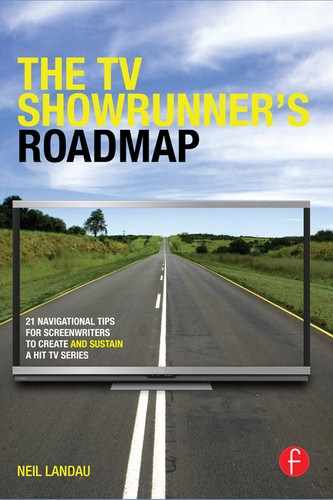Foreword
Writing this book was like stepping into quicksand. My last book was about writing movies, which are finite; once a movie is finished, it can be dissected, analyzed, and interpreted by audiences. But sequels aside, a movie is intended to end—its story set in stone. A classic movie is an indelible, singular sensation.
A television series, on the other hand, is a fluid, continuously unfolding story. The plot thickens. Mysteries deepen. Characters evolve. The end of one episode presents us with more questions than answers. The detectives may catch this perpetrator, but tune in next week for more crime and punishment.
We forge ongoing relationships with our favorite TV series that can often run for a hundred episodes over many years or even decades. As we watch iconic TV characters win and lose, struggle and endure, we feel what they feel; we root for them, pass judgment, yell at the TV screen— and come back for more. They become part of our lives. And when a long running series ends, we collectively feel the sense of loss.
This book isn’t just about classic TV series of yesteryear. Sure, I pay homage to those shows, too. But this is the New Golden Age of Television, so I wanted to stay current. And yet, with the sheer volume of TV series on hundreds of channels, watching all the shows on the air—let alone keeping abreast of their latest plot developments—is a virtually impossible task.
I could have narrowed the playing field by solely focusing on pilot episodes, but I also wanted to explore how series build, evolve, and sustain over time. And so I found myself catching up on long-running series and falling down many rabbit holes. The overwhelming challenge was selecting the best TV series to analyze and which showrunners to interview, along with the trepidation of overlooking someone’s favorite show (I apologize in advance for that). And even as I’d complete an interview with a current showrunner and discuss the show’s latest developments, that series would keep forging ahead, making it harder and harder to get a foothold (hence my quicksand analogy).
When I was a kid and we got our first color TV, there were only three channels: ABC, CBS, and NBC. Now there are almost a thousand. The technology has substantially changed, prompting a steady migration away from the big broadcast networks and the creation of hundreds more niche cable channels (many owned by the parent companies of broadcast networks). If you go by a college dorm, you won’t see many TV sets in students’ rooms; if they’re watching TV, it’s probably on their iPads and laptops and smart phones. Regardless of how they’re watching, I’m confident that the best story telling today exists not in movie theaters but on TV. Sure, reality shows can provide us with a sense of spontaneity, immediacy, and voyeurism. But only great scripted dramas and comedy series can transport us on a journey that transcends real life. Stay tuned.
